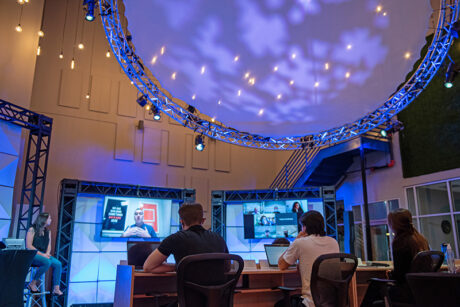
CoiL is an acronym for Continuous Improvement and Learning, but it also represents the first thing most people working in our industry learn—how to coil a cable. And how do we learn this seemingly most basic of stagehand skills? It is taught one-on-one, with most learning it from a more experienced person taking the time to show the new person the proper way and explaining why it is done that particular way. Understanding the reasoning behind how a particular skill, a process, or a broader role is done, makes it a standard that will become part of one’s skillset. As an industry we rely on that shared knowledge, that shared approach to the many different jobs needed to realize the thousands of live entertainment and event projects that take place year around. Which is why Entertainment Technology Partners (ETP), and in concert with their brand, LMG, created and support the CoiL Learning Center, with two U.S. locations at LMG’s facilities in Orlando and Las Vegas, as well as one at an ETP studio in London.
At a time when our industry is having to address labor shortages, many companies and schools are discussing the need to broaden the curriculum of live entertainment and event hospitality training and education. CoiL is an example of an approach that incorporates education as well as awareness of diversity and inclusion to overcome these challenges. And while Coil may be able to boast of their years of success, it is not satisfied and is committed to continually evolving.
David John, ETP’s Chief Operating Officer notes, “The concept of learning at CoiL is rooted in our values of Lead, Teach, and Learn. We believe that everyone has an obligation to never pass up an opportunity to lead, to teach, and to learn. The demographics and needs of our industry are changing and we need to be recognizing that more broadly as an industry. No matter what stage we are at in our careers, there are things each generation can learn from the other, and we must all lead by example. Be an example of cooperation and learning that eliminates barriers. Though most of our programs focus on internal company development training, we are growing our outreach programs and connecting them with other diverse charitable and international programs to help promote our industry and our craft. We currently work with eight universities in the USA and two in the UK. We are extremely passionate about these CoiL programs that go well beyond internal training.”
The CoiL charter is “to promote leadership and learning in the events and entertainment industry.” That CoiL actually does go beyond the loading dock doors of LMG is an aspect that is quite innovative and really does tangibly help respond to the needs of our industry now. While many companies in our industry have strong internal training and internship programs, CoiL offers programs that reach well outside their walls and do not require the participants of their training to stay with ETP or LMG but rather to go forward into the wider industry.
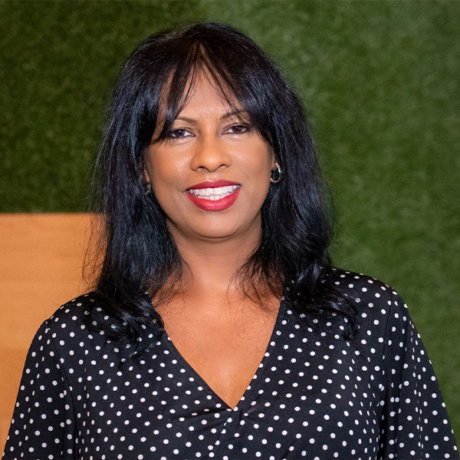
Reaching In and Beyond
PLSN spoke with Ormilla Vengersammy, Director of Academic Programs and Earl Hoback, Technical Programs Manager to better understand CoiL. Looking first at how CoiL supports what LMG is doing internally by offering a range of programs. Vengersammy explains, “Our programs cover Leadership Development, Technical Training, Soft Skills Coaching, Health and Wellness Programs, Productivity Courses, and Mentorship Opportunities. Employees receive professional development as well as education on personal wellness. In the AV industry everyone is working long hours, long days, so we try to remind and help people to take care of themselves mentally, spiritually, emotionally, and physically. Along with those programs we do leadership classes because we believe that everyone can become a better leader in time. We give people the opportunity to learn how to lead and manage within their own team, and to provide career paths for them within the industry. We encourage every individual to discover their own inner leadership voice and style through our classes. We also believe that everyone can be a teacher. Every person has that unique skill; knowledge, and talent that someone else can benefit from, so we give everyone in our programs the opportunity to give back, to teach, and mentor, and that really helps to also cultivate their leadership skills.”
Vengersammy went on to describe the many training opportunities available to the next generation as well through CoiL. “There are a number of CoiL‘s outreach programs that we do within local communities and by connecting with educational partners. We have a professional internship program where we connected with universities throughout the country. We want to introduce students not only to the AV world but also be able to show them how to take what they learn in the classroom and apply it in the real-world environment. Students who are studying entertainment or hospitality, which really works hand in hand with our industry, all need to have internship credits in order to graduate. Our professional internship program is a semester long and it‘s a paid internship requiring an average of 20 hours a week. We have annually 40 to 50 interns throughout the U.S. working with us. Our internship program allows our students not only to work and learn within the department they are assigned but also, we give them the opportunity to network and to connect with other people in our industry. We have many different brands within ETP, and they‘re allowed to shadow different areas. So, if someone is working in marketing and they want to learn a little bit more about touring, they can spend time in touring to learn about what they do there. It is very much focused on being about the learning experience. We have programs for technical development, for students who might be more tech savvy and they want to learn more about audio, video, LED, and lighting. We also have programs that are more on the business side of our industry, learning about project management, human resources, accounting, and IT.”
“LMG also offers a unique program to students called Flex Force,” points out Vengersammy. “That is for students who are currently going to school, people who need a flexible schedule, not necessarily an internship program. So, they’re able to learn, while still keeping their own school schedule by picking up different shifts and learning about the AV industry. It’s 12 hours a week, requiring a minimum of three 4-hour shifts a week. They select their shifts through an app and are assigned to a department. They might start off with the audio department, which requires 16 shifts to complete, and within each shift they’ll learn about audio. When they’ve completed their track in audio, they move to video shifts, then LED, and then lighting. The training and experience they’re getting is well rounded. When they go through all the disciplines and phases of Flex Force training, they are well prepared to accept full time roles within the organization.”
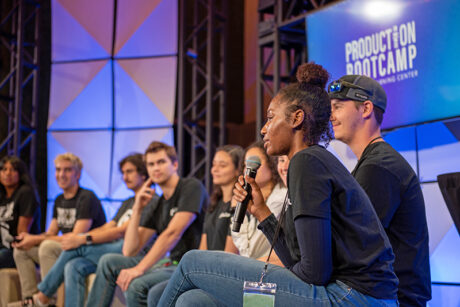
Opening Doors to New Possibilities
Perhaps one of the most transformative CoiL programs to the future of the industry is their Stagehand Bootcamp. As they note on their website, “…a perfect opportunity for passionate and curious individuals who would like to jump-start their career as stagehands in the live events industry! …For Stagehand Bootcamp we want to reach anyone in the community interested in the AV industry, regardless of their experience and background.” It is currently a free training experience that is offered throughout the year at LMG’s various offices and facilities. “We reach out into the wider community, through schools, job posting sites, really trying to go well outside the industry,” states Vengersammy. Being only 12-hours, the goal is for participants to leave able to take an entry level stagehand job. “It is a focused course,” she describes, “We first talk about etiquette and expectations on show site. Then we move more into the technical part of being a stagehand. We discuss the soft skills needed to be a stagehand, but we also show them how to pack and unpack a truck because there’s an art to that, an understanding needed of why and how it is expected to be done. And of course, they learn to properly coil cables. We also focus a lot on safety, and here is also technical training of some things that they need to know to be successful. Once they’ve successfully completed those 12 hours, we feel that they can successfully perform the role of stagehand on show sites. They can take those skills and that knowledge to work on one of our projects but also can go take gigs from any other company.”
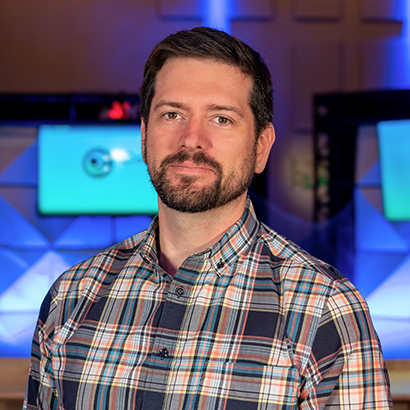
Hoback agrees with Vengersammy on the importance of all the CoiL programs and feels strongly that the Stagehand Bootcamps is a much needed program. “It is hard to do that basic skills training on show site, especially in today’s industry with short time to load-in and everyone being short on labor for the calls. You see someone brand new to the industry walk on site and all you’re thinking about is time, “how am I going to get this done as quick as humanly possible so that we’re ready for the rehearsal, the sound check? I don’t have time to teach the new stagehand.” Right now, there is a real need for skilled stagehand labor able to walk on to show site and be able to do the job. The Stagehand Bootcamps are our answer to that need and that missing training in the industry. It is about not only helping our own companies but also really helping build up that labor pool with people who have at least some base level skills.”
But it is also much more than simply filling the labor pool, it is about diversifying that labor pool, being inclusive to everyone who wants to be in the industry. That is a particularly meaningful effect of offering the Stagehand Bootcamps for free to Hoback. “Right now, as an industry we are starting from pretty much a clean slate. And while it’s very frustrating in some ways, it’s also really cool because it is a chance to give everybody the opportunity to come into the industry, to bring in more diversity and actually be much more inclusive. The Stagehand Bootcamps give everyone a chance to learn those basic skills through professional free training, so they are able to do the job. Over this past year it has become very clear to me how important the CoiL Stagehand Bootcamps are, not just to any one company, but to the industry overall. That is something I am particularly proud of, that CoiL’s programs address the question, how do we make this a career possibility that was unobtainable for people that maybe in an underrepresented class or just thought something like this was never a possibility for them. There’s all of this talent, all of these skill sets among people who are only now finding their way into the industry. And I have to say that doing these trainings I’ve had the opportunity to meet some really amazing individuals that I know are going to do really well in the industry. I know for a fact I’m probably going to be reading about some of them in publications like PLSN in the future.”
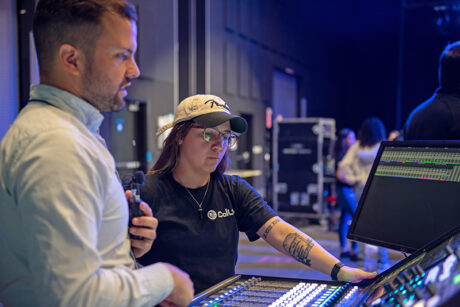
Education Outreach
“The industry hasn’t had as much connection to early career education as we should have had and now, we are seeing that gap,” comments Hoback. “As we do outreach with our educational partners for CoiL, we see that many students don’t even see this industry as an outlet. There are of course the people who study stagecraft and theater and know about the live entertainment and events industry, but there’s a much larger pool of students that are interested in it but have no idea how to find the door into it. That is a big part of what we are doing with the outreach into the universities and also the trade schools. We recently went to a technical school in Las Vegas where some of the students are looking at being automotive mechanics. They didn’t necessarily make the connection of how something like that program could work in our industry until we describe it to them. It is directly related, if we’re rigging anything or doing any type of automation, we’re using motors every day. There’s a direct connection there. We talked to a group of 20 students and almost every single one of them were pretty much ‘sign me up’ at the end. Before that they just had no idea. Then you have the people who want to get into the industry and simply don’t know how to start. If you go to a concert and you think, I want to see how to do that, you don’t go home and find a job ad; you don’t even know the name of the job. The CoiL programs, Stagehand Bootcamps, Flex Force, and the internship programs, are all helping bridge that gap and answer those questions of how you get started. Here at CoiL, we are helping connect those dots.”
Coil’s impact for the future looks promising, and it is readily apparent in those we talked with that this team is trying to do something good to better their communities and the overall industry. Since its launch in 2016, CoiL has practiced the “continuous improvement” philosophy they teach by adding new curriculum, locations, partners, and tools. A new Coil location is planned to open this summer in Central London to build on their international reach. “We hope that Coil becomes a platform for a broader group to find careers in the field that we love and that we can all improve by sharing and helping each other,” stated John. “Coil has allowed us to marry our passion for education and learning with a bigger purpose; helping those around us while we also continuously learn and improve.”
Vengersammy concludes, “Whether it is internal employee training for professional and personal development or outreach and education partnerships to train and bring new people into the industry, the programs offered by CoiL are able to build confidence, build skills, and find leadership qualities that prepare them to succeed as they start out or continue on their career path.” It is clear that everyone involved in CoiL passionately believes in their mission to Lead Modestly, Teach Generously and Learn Intently.
Learn more about the programs of CoiL at www.coillearningcenter.com. For LMG go to www.lmg.net and for ETP go to www.etp.net.


